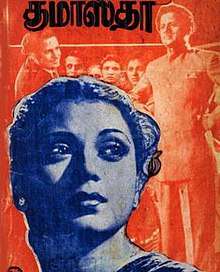Gumastha (1953 film)
Gumastha (English: Clerk) is a Tamil language film released in 1953 with Chittor V. Nagaiah, R. S. Manohar and Pandari Bai in the lead roles. The film was produced in Tamil and Telugu under the same title.[1][2]
| Gumastha | |
|---|---|
 Film Poster | |
| குமாஸ்தா | |
| Directed by | R. M. Krishnasami |
| Produced by | V. C. Subburaman |
| Written by | A. T. Krishnasami |
| Screenplay by | Acharya Athreya |
| Story by | Acharya Athreya |
| Starring | V. Nagaiah Pandari Bai Jayamma P. V. Narasimha Bharathi |
| Music by | C. N. Pandurangam G. Ramanathan Nagaiah |
| Cinematography | R. M. Krishnasami |
| Edited by | P. V. Manikkam Bal G. Yadhav |
Production company | Aruna Films |
| Distributed by | Film Center Limited |
Release date |
|
Running time | 16,912 ft. |
| Country | India |
| Language | Tamil |
Plot
Ranganathan is a government clerk struggling in life with a low salary and a big family. He has to support his aged father, his wife, two children, his brother Gopu and an unmarried sister, Susheela.
Though Gopu is a smart young man, he couldn't continue his college education due to the financial situation in the family. In the meantime, a rich man's son, Ravi meets Susheela and gets attracted towards her. Eventually, they both become lovers. Ravi has a medical problem in the heart. The doctor advises him against marriage. But he dismisses it and marries Susheela. She comes to know about Ravi's medical condition and refuses to be intimate with him. However, one day Ravi forces and make love to her due to which she becomes pregnant.
People, who know about Ravi's medical condition, suspects Susheela as carrying someone else's child. She becomes distressed. Her old father, learning about her plight, dies of shock.
How the government clerk Ranganathan, her brother, solves the problems forms the rest of the story.[1]
Cast
Cast adapted from the songbook[3]
|
|
Production
The film was produced by V. C. Subburaman under the banner Aruna Films and was shot at Film Centre, Madras.[1]
Sound Track
Music was scored by C. N. Pandurangam, G. Ramanathan, Nagaiah and while the lyrics were penned by A. Maruthakasi and S. D. S. Yogiar. Singers are: V. Nagaiah and Jayamma. Playback singers are A. M. Raja, P. Leela, M. L. Vasantha Kumari, Rani, Kasthuri and Chellamuthu.[1][3]
| Track | Song | Singer(s) | Lyricist | Composer |
|---|---|---|---|---|
| 1 | "Aadhari Jegadheeswari Amba" | Jayamma | Maruthakasi | C. N. Pandurangam |
| 2 | "Aiyavin Penndattikku" | M. L. Vasanthakumari, Chellamuthu | S. D. S. Yogi | |
| 3 | "Aasaiye Veen Aanadhe!" | P. Leela | Maruthakasi | Pandurangam |
| 4 | "Sopalangi Mappillaikku" | Rani, Kasthuri & Party | Maruthakasi | G. Ramanathan |
| 5 | "Inbamo! Thunbamo! Edhuvume Nilladhe!" | Raja | Maruthakasi | Pandurangam |
| 6 | "Theeradha Varumaiyudan" | Jayamma | Maruthakasi | |
| 7 | "Hey Manidha! Enge Odugirai?" | Nagaiah | Nagaiah | |
| 8 | "Dance Baby Dance!" | M. L. Vasanthakumari | Maruthakasi |
References
- "Gumastha 1953". The Hindu. 24 October 2015. Archived from the original on 22 January 2017. Retrieved 30 May 2018.
- Ashish Rajadhyaksha, Paul Willemen (1999). Encyclopedia of Indian Cinema. Fitzroy Dearborn Publishers. p. 332. ISBN 1-57958-146-3.
- குமாஸ்தா